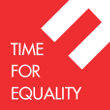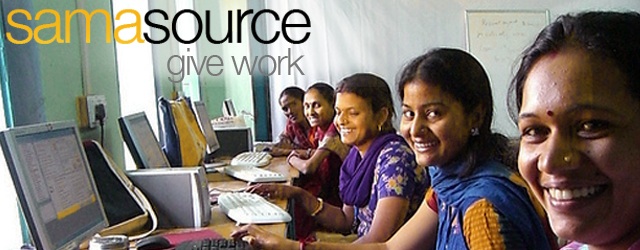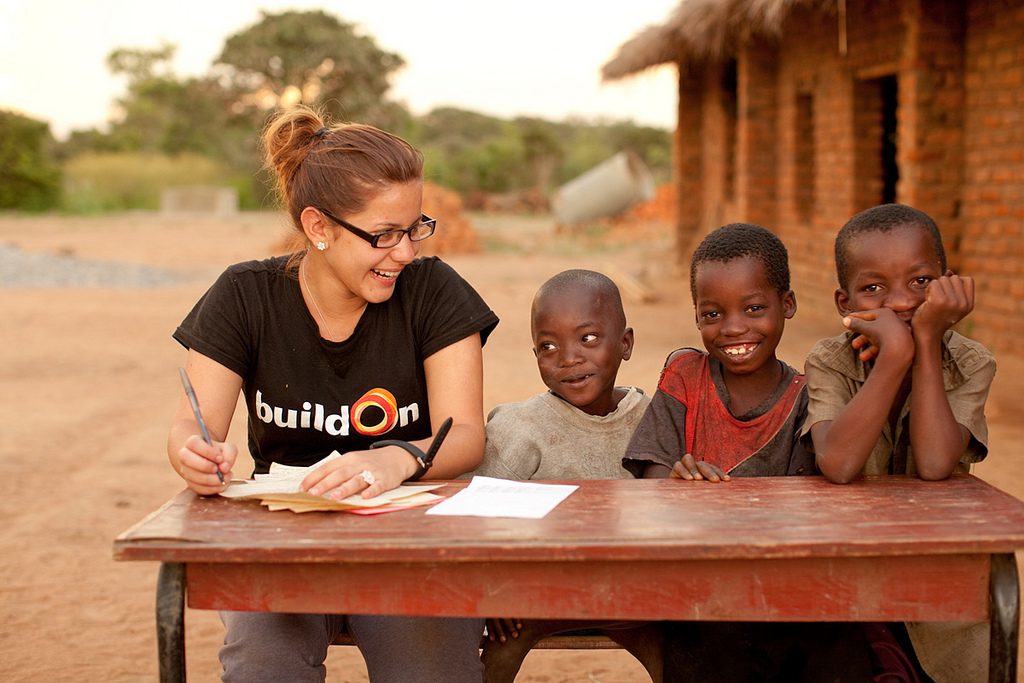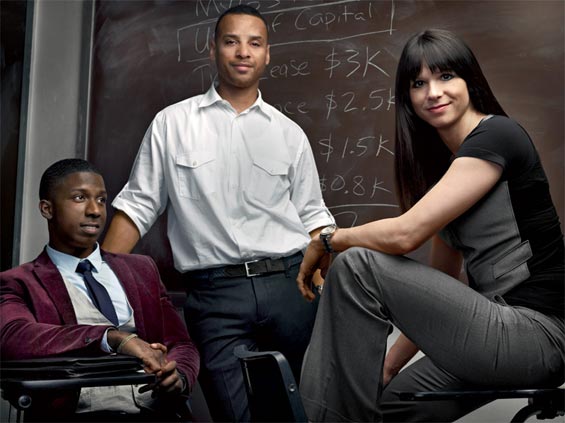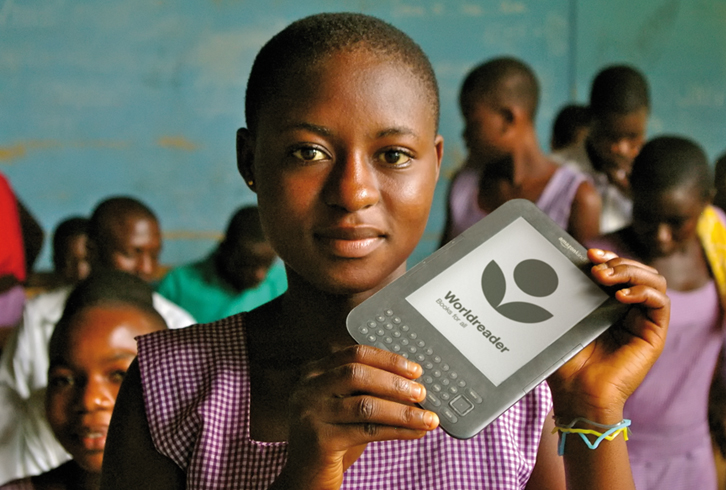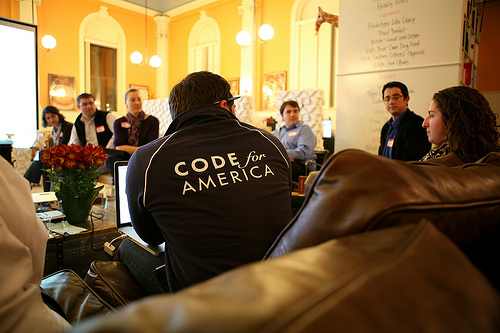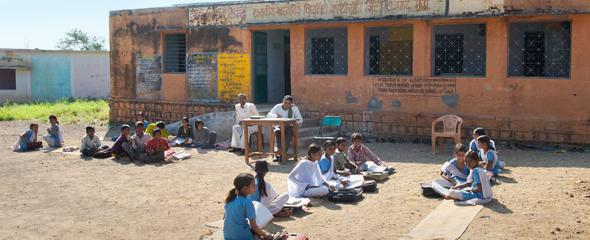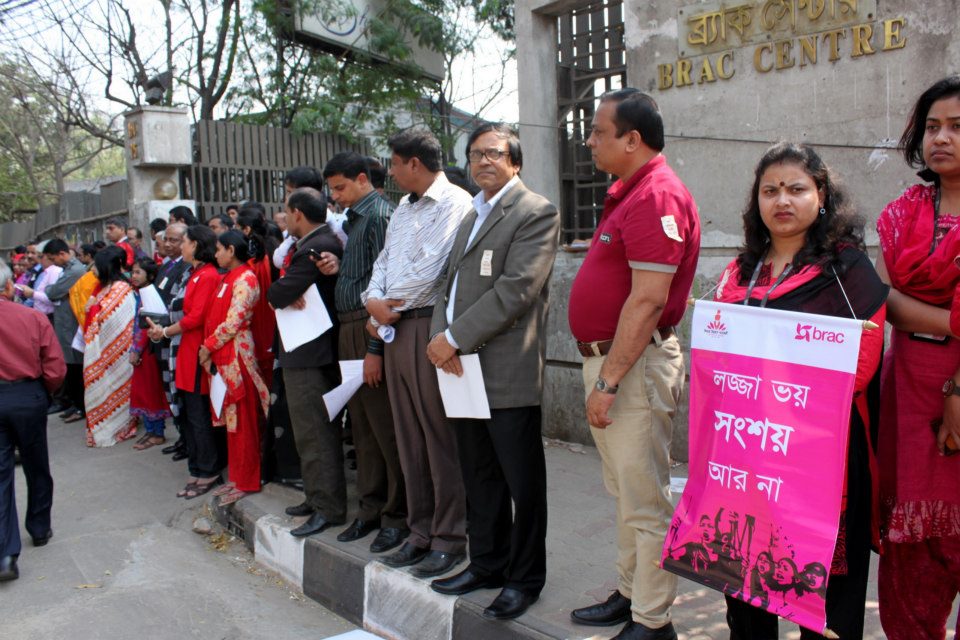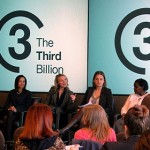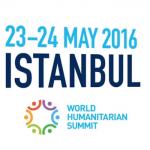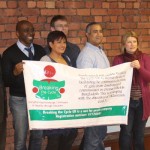Check out these 14 organizations changing the world through education. We know that education is the greatest foundation a human being can have. These organizations are changing communities through literacy, computer literacy, building schools, and creating after school programs. These organizations span from the inner cities of America to the most rural parts of the world to bring education to children and adults.
Rural African education, as it stands today, is not producing digitally literate individuals. Nor is it effectively engaging learners in skills that are required for competitiveness in the twenty first century workplace. Young learners need specific, marketable skills if they are to sustainably empower themselves, their families and their communities.GWFs vision is to lead a sustainable model of learning that can be introduced to rural African communities. The model will focus on delivering “digital-era” literacy education and career training via community-driven digital learning centers of excellence. The centers need to be digitally-powered and “online”, allowing rural communities access to world-class education and cutting-edge technology. GWF wants to see rural African learners immersed in high impact learning experiences that are presented as they would be in the world’s most technologically advanced classrooms.
Samasouce uses four creative steps to provide its life changing workflow to provide skills and work for the developing world. SOURCE CLIENT PROJECTS : Our work begins in San Francisco, where our sales team sources large-scale data projects from clients such as Google, LinkedIn and Microsoft. Projects vary for each client and can include basic Internet research, image tagging and transcription services. CONVERT PROJECTS INTO SMALL TASKS : This is where our Microwork™ model comes in. Project managers load these big data projects onto the SamaHub, our proprietary technology platform, which breaks them down into small, digital tasks and delivers them to our partner centers around the world. Our local partners follow our social impact guidelines and provide critical in-country infrastructure and computers. RECRUIT & TRAIN WORKERS : Samasource works with in-country partners to recruit women and youth formerly earning below a local living wage, as determined by the Fair Wage Guide. These recruits receive 2-4 weeks of computer-based training on the SamaHub, including English and soft skills, to prepare them for performing work. Once they finish training and demonstrate proficiency on trial projects, workers begin performing tasks for client projects, and in turn begin to earn a living wage. DELIVER COMPLETED PROJECTS : Each unit of work goes through a rigorous quality-assurance process via the SamaHub and is ultimately aggregated into complete projects and returned to the client.
afterschool youth service programs mobilize urban teens to lift up their communities and change the world through intensive local community service and by building schools in some of the poorest countries on the planet. We are a movement of students, educators and communities. We believe in the power of partnerships that passionately act for the common good. Through our afterschool programs, teens inspire people across neighborhoods, across cities, and across continents to reach and think beyond their realm of possibility. buildOn’s Global School Construction Programprovides rural communities in developing nations across the globe with access to education. We are breaking ground on a new school every four days with the help of our U.S. afterschool program members, donors and parents who have provided almost 1,000,000 volunteer work days to build schools for their children. Through a methodology that puts gender equality at the forefront and villagers in control, we are providing not only schools, but the knowledge and the power to change entire communities.
Defy transforms the lives of business leaders and people with criminal histories through their collaboration along the entrepreneurial journey. We harness the natural talents of formerly incarcerated individuals and redirect them toward the creation of profitable and legal business ventures. Defy offers a suite of services that includes intensive personal and leadership development, competition-based entrepreneurship training, executive mentoring, financial investment, and business incubation. By engaging top corporate executives, investors and entrepreneurs nationally, Defy catalyzes broad scale personal and economic opportunities for formerly incarcerated individuals, and shatters perceptions of one of the most stigmatized and overlooked populations in America.
Since its inception, the long term objective of the Barefoot College has been to work with marginalized, exploited and impoverished rural poor, living on less than $1 a day, and lift them over the poverty line with dignity and self respect. The dream was to establish a rural college in India that was built by and exclusively for the poor. What the rural, impoverished and marginalized think important is reflected and internalized in the beliefs of the College. The Barefoot Collegeis one of the few places in India where Mahatma Gandhi’s spirit of service and thoughts on sustainability, are still alive and respected.
Worldreader is a non-profit on a mission to eradicate illiteracy among the world’s poorest people. Here’s how they do it: We start early using e-readers in primary schools where if kids fall behind, they almost never catch up. Kids begin reading thousands of local stories together with great international books that we’ve curated into the largest most culturally relevant libraries of books. Our method is the most effective and inexpensive way to eradicate illiteracy globally. As of recently, Worldreader has wirelessly distributed more than 721,129 African and international e-books to children in 9 sub-Saharan African countries. And the results are staggering: in less than 5 months children show significant improvements in fluency and comprehension and the gender gap closes. Once these children are active readers, together with their families they can continue to access our content via our mobile phone appavailable to 80% of the developing world via feature phones– helping people make decisions, learn, grow and change their lives.
Code for America is a 501(c)3 non-profit that envisions a government by the people, for the people, that works in the 21st century. Across America, government employees are accelerating city innovation by sharing their best ideas, collaborating with local civic hackers, and enlisting elite technologists for a year of service. Our programs change how we participate in government by: – connecting citizens and governments to design better services, – encouraging low-risk settings for innovation; and, – supporting a competitive civic tech marketplace. Current cities include:Kansas City, MO – Kansas City, KS – Las Vegas, NV – Louisville, KY – New York City, NY – Oakland, CA – San Francisco, CA – San Mateo County, CA – South Bend, IN – Summit County, OH
In the 1990s, half of the world’s illiterate children were in India. We created Pratham to change that. We believe education is the fundamental right of every child and no child should be deprived of this basic right simply because he or she does not have access to it or does not have the resources to realize his or her dreams. Pratham means “first” in Sanskrit. We are the first major organization to achieve lasting, wide-scale success in educating India’s youth. Our mission is to improve the quality of education in India and to ensure that all children in India are not only attending but also thriving in school. Using very low-cost and scalable methods, Pratham works in collaboration with the government, local communities, parents, teachers and volunteers across the country to achieve its mission. We’ve reached over a million children in India. Since our beginnings in the slums of Mumbai in 1994, we’ve become the largest non-governmental organization working to provide quality education to rural and urban children throughout India. Today, Pratham’s programs—including pre-schools, community libraries and remedial learning programs—reach millions of children every year.
Reading Is Fundamental (RIF) is the largest children’s literacy nonprofit in the United States. We prepare and motivate children to read by delivering free books and literacy resources to those children and families who need them most. We inspire children to be lifelong readers through the power of choice. RIF provides new, free books for children to choose from and make their own. The seeds of inspiration in these books have motivated children to follow their dreams and achieve their potential. Yes, it seems incredible for a book to launch a life, but it happens every day as hungry, inquisitive young minds reach out and grab hold of the new people, places, and ideas that books bring them. Nearly two-thirds of low-income families in the U.S. own no books. Planting seeds of inspiration in our nation’s most vulnerable children is what RIF and a network of more than 400,000 volunteers do. Whether in schools, homeless shelters, or community centers—wherever you find children—RIF volunteers spend countless hours distributing books, staging reading motivation activities, and promoting the importance of literacy in their communities.
Springboard Collective
Springboard builds pathways between teachers, families, and students in order to close the reading achievement gap by 4th grade. We stand apart as service providers by taking an insourcing, rather than outsourcing, approach. Springboard transforms school communities from within by training their existing teachers to collaborate with their existing parents in pursuit of shared goals. This approach builds capacity internally by rearranging the people and assets already in school communities to optimize educational outcomes. Since launch in 2011, Springboard has grown its reach from 42 to 642 students. Last May, we landed a groundbreaking vendor agreement with the School District of Philadelphia,making Springboard the only district-funded summer learning provider in the city. The contract also marked the first time in recent history that the district has invested in a startup. Our 642 scholars replaced what would have been a 3-month reading loss with a 3.3-month reading gain, lifting their literacy trajectories by more than 6 months. A longitudinal analysis of our re-enrolling students found that Springboard nearly tripled students’ annual reading progress. Weekly workshops training families to teach reading averaged 93% attendance, defying expectations and setting records in every school. By training parents and teachers to collaborate, Springboard puts kids on a trajectory that closes the reading achievement gap by 4th grade.
Connecting for Good, Inc. is a 501(c)(3) a nonprofit organization that has been working to bridge the Digital Divide in the Kansas City metro area since 2011. Our organization is dedicated making sure that everyone has access broadband Internet, regardless of their incomes. While Internet access is available at libraries, schools and other public institutions, we believe connectivity in the home is essential for all Kansas City families if they are to fully participate in our digital society.Connecting for Good uses wireless microwave technology to bring Internet access to low income families via WiFi mesh networks. We are also working for more public Internet access by building community computing centers and free Wi-Fi hotspots throughout the city. For under resourced residents of Kansas City’s urban core, we offer low cost refurbished PCs and digital life skills classes several times a week. And we provide technology assistance to nonprofit organizations Digital inclusion is one of the most important social justice and economic development issues of our day. In our digital society, the unconnected are a growing underclass. People without access to the Internet are unable to apply for jobs online, connect with family and friends, access virtual library shelves, or gain information about medical and health issues. They can’t participate in Internet-based GED classes and online higher education or experience the cost-saving advantages of online shopping. Simply stated, they are shut out of the benefits of connectivity that most of us take for granted. This is tragic in light of all the resources that are available on the Internet that have the potential to help an under resourced family move toward a healthier, happier and more secure future.
With education programs in six countries, BRAC has built the largest secular, private education system in the world, with over 700,000 students worldwide enrolled in BRAC primary schools. These schools are designed to give a second chance at learning to the disadvantaged students left behind out from the formal education systems. Complementing mainstream school systems with innovative teaching methods and materials, BRAC’s education programs open primary schools in communities unreached by formal education systems, bringing learning to millions of children, particularly those affected by extreme poverty, violence, displacement or discrimination. At the pre-primary level, we also target underprivileged children to prepare them for mainstream primary school entry. At the secondary level, we provide need-based training’s, student mentoring initiatives, and e-learning materials to improve the mainstream secondary education system. We are giving increasing attention to adolescent and youth as a special group and offering life skills, livelihood and skills development training, as well as saving and financial services such as savings accounts. Our multipurpose community learning centers promote reading even to those who cannot move from their houses through mobile libraries. In our 26 years of history we have provided basic education to around 10 million students in Bangladesh, with graduates from our non formal primary schools numbering nearly five million. Till date,BRAC has successfully opened 410 schools in Philippines; of which, 292 are pre-primary schools and 118 are primary schools.
In the years leading up to Hurricane Katrina, academic performance in New Orleans public schools was abysmal, and the school system was riddled with corruption and debt. By 2005, nearly 75% of eighth graders did not meet basic standards in reading while 70% scored below basic in math. The New Orleans public school system was the lowest performing district in Louisiana (and Louisiana was the second-lowest performing state in the U.S.). In 2003, the Louisiana legislature created the Recovery School District (RSD) to take over failing public schools across the state. Prior to Katrina, the RSD oversaw five schools in New Orleans. But after the storm, New Orleans was declared a “district in crisis”, and the RSD took over 107 of the 128 schools in New Orleans. That takeover created the vehicle for the reforms that followed New Schools for New Orleans (NSNO) was developed in 2006 to support the accelerating school reform effort. As the landscape in New Orleans is utterly unique, NSNO developed an innovative model to support and enhance these transformations. As the result our work– as well as the tremendous efforts of others – New Orleans was recently ranked as the nation’s leading urban reform center by the Fordham Institute. New Orleans now stands at the forefront of national reform efforts in the areas of parental choice, human capital, school autonomy, and district governed performance management.
Room to Read had its humble origins in Nepal in 2000, where we began bringing donated books to rural communities. Today, we are a global organization dedicated to promoting and enabling education through programs focused on literacy and gender equality in education. We achieve this goal by establishing school libraries, building schools, publishing local-language children’s books, training teachers on literacy education and supporting girls to complete secondary school with the life skills necessary to succeed in school and beyond. We currently work in Bangladesh, Cambodia, India,Laos, Nepal, South Africa, Sri Lanka,Tanzania, Vietnam and Zambia – with plans to expand so we can bring educational opportunities and resources to children throughout the developing world. Room to Read’s programs have benefited more than 7.8 million children so far and we are on track to reach 10 million children by 2015. Imagine a world in which every child has access to an education. Room to Read is doing our best to make this dream a reality, one child at a time
Note: This post was written by Grant Wish and originally appeared on Plus Social Good.
